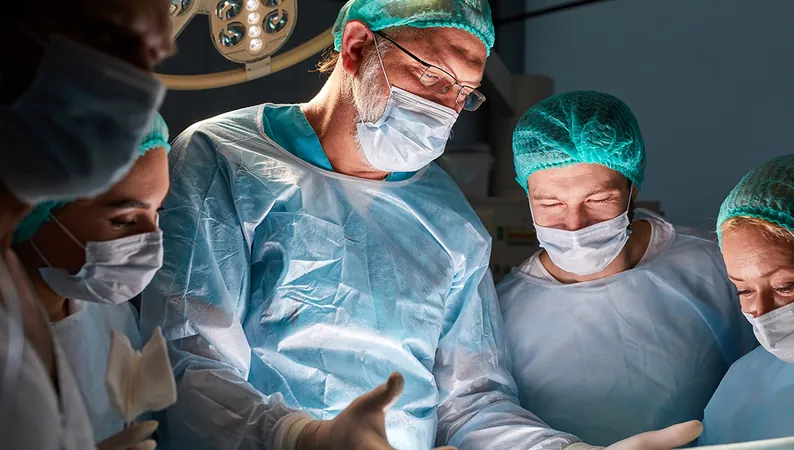
Boosting Surgical Efficiency: The Critical Role of Team Familiarity in Cardiopulmonary Bypass
2024-12-18
Author: Siti
Introduction
Recent research has highlighted a significant factor in enhancing surgical efficiency during cardiopulmonary bypass operations: the familiarity of the surgical team. A study involving cardiac surgeons, anesthesiologists, and perfusionists has revealed that while team familiarity does not have a notable impact on patient morbidity and mortality, it is directly associated with quicker cardiopulmonary bypass times, particularly during emergency procedures.
Key Findings
Dr. Tyler M. Bauer and his colleagues from the University of Michigan indicated that improved team efficiency can result in reduced costs and enhanced productivity, making this aspect particularly vital in today's healthcare environment. Their extensive analysis of registry data shows a clear connection between the frequency of collaborative procedures by team members and the efficiency of operations within the operating room (OR).
Published in the journal *Circulation: Cardiovascular Quality and Outcomes*, the study examined over 13,500 surgical cases across three leading academic medical centers from 2014 to 2021. It categorized surgical teams into three groups based on their level of familiarity—low, moderate, and high—based on the number of shared operations in the year preceding the surgery. The findings revealed that a higher familiarity among team members was linked to significantly reduced cardiopulmonary bypass times, dropping by an average of 2.02 minutes for each unit increase in team familiarity.
Patient Safety Outcomes
Despite the efficiency gains, the study found that team familiarity did not correlate significantly with patient safety outcomes. The operative mortality rate was relatively low at 3.2%, with a composite morbidity and mortality rate of 17.3%. This raises important discussions among medical professionals about the benchmarks for evaluating surgical performance.
Expert Opinions
Doctor Daniel T. Engelman, a participant in the study, emphasized that familiarity promotes success, noting that when teams operate together regularly, they develop a seamless workflow which can enhance performance. He argued for a structure of "niche teams" specializing in cardiothoracic surgeries, advocating for smaller, more cohesive groups in hospitals. This is vital as larger medical institutions tend to have a high turnover of staff, which can impede the development of this crucial familiarity.
Further compounding the issue are the challenges posed by the hiring of temporary staff, such as traveling nurses and technicians, who may lack the contextual understanding essential for high-stakes surgeries. Engelman remarked that while these practices might not lead to adverse patient outcomes, they do contribute to inefficiencies during surgical interventions.
Future Research Suggestions
The researchers suggest that future studies should explore the effects of team familiarity on various surgical outcomes, including resource utilization, recovery times, and overall patient satisfaction in conjunction with efficiency metrics.
Conclusion
As the landscape of cardiothoracic surgery evolves, fostering surgical teams that work closely together could not only improve operational efficiency but positively influence the overall patient experience in cardiac care settings. The call to action is clear: hospitals should reevaluate their team dynamics and structure to prioritize familiarity, enhancing both the speed and safety of cardiac operations for the benefit of their patients.
Final Thought
Is your heart in the right hands? The efficiency of surgical teams might just be the lifesaver you never knew you needed!




 Brasil (PT)
Brasil (PT)
 Canada (EN)
Canada (EN)
 Chile (ES)
Chile (ES)
 Česko (CS)
Česko (CS)
 대한민국 (KO)
대한민국 (KO)
 España (ES)
España (ES)
 France (FR)
France (FR)
 Hong Kong (EN)
Hong Kong (EN)
 Italia (IT)
Italia (IT)
 日本 (JA)
日本 (JA)
 Magyarország (HU)
Magyarország (HU)
 Norge (NO)
Norge (NO)
 Polska (PL)
Polska (PL)
 Schweiz (DE)
Schweiz (DE)
 Singapore (EN)
Singapore (EN)
 Sverige (SV)
Sverige (SV)
 Suomi (FI)
Suomi (FI)
 Türkiye (TR)
Türkiye (TR)
 الإمارات العربية المتحدة (AR)
الإمارات العربية المتحدة (AR)